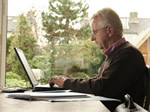
Gerard Jansen takes part in European Social Fund ‘e-papa’ project and is able to combine childcare and work.
Water is a big issue in the Friesland region of the Netherlands, where much of the land is reclaimed and sits below sea level. This means that Gerard Jansen’s job as a lawyer for the regional water board is a busy one.
“There are always conflicts of interests,” says the 53-year-old. “Farmers for instance may want higher water levels, but the general public doesn’t. We have to find the balance.
“Sometimes the companies don’t want to spend the money [to comply with legal regulations] and it ends in court,” he adds. When conflicts like this come up, Gerard is the man who deals with it. He has worked for the board since 1993 and acts as a legal adviser to the enforcement and licensing department.
His department has a number of roles – checking surface water meets legal standards, ensuring that sea defences are maintained and sea levels are correct, that companies and landowners comply with regulations and, finally, taking action when they do not. This means that he deals with “all phases of the legal process”.
Although Gerard likes his job, a few years ago he began to want greater flexibility in his schedule. With two young sons, Rik and Nico, and a daily car journey from his home in Drachten to Leeuwarden taking up to an hour, the rigid working hours were taking a toll. He also began to have difficulties concentrating in his office. “We moved a few years ago to a new open plan office. It’s very noisy.”
Working from home
In 2006 he started to take part in ‘e-papa’ – a project co-funded by the European Union through the European Social Fund to help male employees work from home. The scheme helps to enable more flexible hours and cuts down on travelling.
He is now based at home for part of the week, enabling him to take the boys to school, have lunch with them, help with their schoolwork and even fit in some housework.
“Teleworking has helped me find a better balance between my work and family life,” he says, adding that it takes the pressure off his wife who works part time as a geriatric nurse in a nearby hospital. “Before, I only saw the boys in the evening. Now I get to do different things with them.”
And the more flexible arrangement has also improved his work and productivity. “If you’re working at home you don’t have to stop and leave at 5 o’clock – you can finish what you started at your own pace. You can come back to it later on.”
How the scheme worked
The scheme makes it easier for organisations to put flexible working arrangements in place. It increases awareness of the benefits of teleworking for employers and regularly assesses how employees are adapting to teleworking, flagging up potential issues early on. Gerard took part in the project for two years, during which time he responded to questionnaires about how it was working out.
Through the scheme, the water board has realised the benefits of teleworking and now actively promotes it among employees. “As a modern employer you need to provide opportunities for more flexible working,” explains Gjil de Jong, who is Gerard’s line manager.
She teleworks herself and estimates that about a quarter of the employees in her department now have similar arrangements. “It definitely helps improve the balance between work and family life,” she says.
She says it is important to have a clear agreement about what is expected from both sides – in terms of being available or reporting work done – and simple procedures. “We also make sure that we have a regular meeting the day after teleworking to catch up on what’s happened,” she adds.
Gerard, for one, is a sound advocate of the more flexible arrangements. “It’s a big help,” he says. “Next year, I’m going to increase the number of days I work from home.
